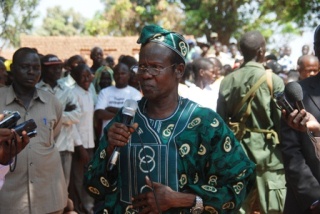Western Equatoria border dispute conference begins
January 18,2012 (TOMBURA) – A three-day border dispute conference between Tombura and Nagero counties of Western Equatoria state began on 18 January in Tombura Freedom Square.

Igga said that there is a dispute between the Azande and Balanda groups of the state “which if not addressed will be like Akobo and Pibor”.
The conference was organised by the Government of Western Equatoria in partnership with Reconcile International, a church based organisation in collaboration with the Catholic Diocese of Tombura, Yambio.
Addressing the participants of the conference Igga said the Government of South Sudan (GoSS) “is looking forward to the stabilization of the economy of the country, more specially food production”.
Igga stressed that during the Sudanese civil war, which ended with the signing of the Comprehensive Peace Agreement (CPA) in 2005. Keji Keji, Yei and Western Equatoria areas were feeding the rest of Sudan. Igga put the area’s decline down to the attacks by the Ugandan militia, the Lord’s Resistance Army.
He encouraged communities of the state to focus on the food production.
The UN estimates 20,000 people have been displaced by the ongoing conflict around Pibor in Jonglei state. Much of this conflict centres around reprisal attacks between members of the Murle and Luo-Nuer ethnic groups.
In an address in Juba on Thursday, Hilde Johnson, the United Nations Special Representative of the Secretary General in South Sudan said Dinka communities are now also involved in the conflict.
The Azande are the third most populous ethnic group in South Sudan. They are predominantly found in Maridi, Yambio and Tombura districts in the tropical rainforest belt of Western Equatoria and Bahr el Ghazal. They are also found in the Central African Republic (CAR) and the Democratic Republic of Congo (DRC).
The Balanda inhabit the land stretching from the equator in Western Equatoria along the borders with the CAR and the DRC to about 7.5 degrees above the equator in Western Bahr Ghazal.
Igga explained that the delegation aiming to solve the dispute is not from Western Equatoria, and is neutral.
The deputy governor of Western Equatoria State, Sapana Abuyi said it is important for the government of Western Equatoria to collaborate with the national government to address the issues.
Abuyi appreciated the efforts of the organisers of the conference and the churches for their struggle to bring peace between the two conflicting communities.
This is the third time the border conflict between Tombura and Nagero regions has been discussed, yet peace has thus far remains illusive.
Since the Nagero, which was a payam [district] of Tombura, became a county in 2004, no clear border has been demarcated.
No resolution has been reached so far between the two conflicting communities on where the border should be. The conflict arose as the communities of Nagero, who are predominantly Balanda, said their border with Tombura is at Yubu river, which is only 3 km from Tombura town. The residents of Tombura says their border should be at Ngoni.
During the presentation by the two communities, the chairperson of Nagero consultation committee, Peter Zamba, said that after the consultation of 792 community decision makers of Nagero, it had been decided that no extensions would be made to the border from the river Yubu to Mosupo or Ngoni.
He added that the two parties agreed to the 1956 border drawn up by the ex-colonial power, Britain.
The communities of Tombura, represented by Simon Ngbidigi, said the border should remain as it was before the signing of the CPA, with its border in Boo. This would demote Nagero to a payam of Tombura.
The ex-governor of the Western Equatoria, Samuel Abu John Kabbash, issued a decree in 2007 annexing the Ngoni river to be the border of Nagero and Tombura, which was rejected by the communities of Nagero.
(ST)
